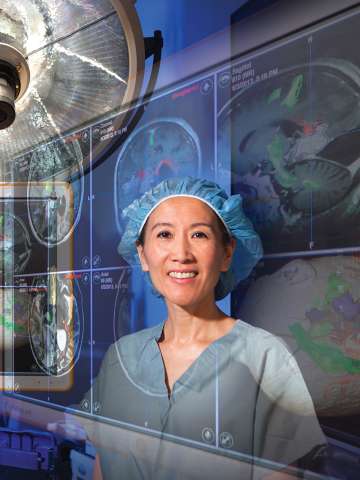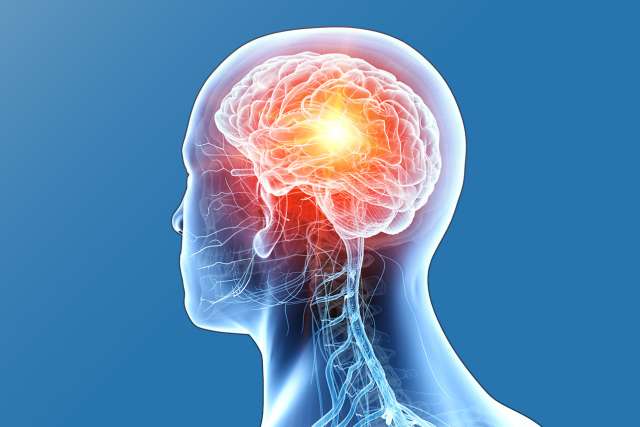Brain Tumor & Brain Cancer Treatment
Recognized as a top 10 hospital for brain cancer care, the UCLA Health Brain Tumor Center offers the most medically advanced treatments and leading-edge research.

Why choose UCLA Health for brain cancer care?
Our Brain Tumor Center experts deliver care to more than 800 patients annually through the UCLA Health Jonsson Comprehensive Cancer Center (JCCC). The National Cancer Institute designated the JCCC and the UCLA Health Brain Tumor Center as one of only six Brain Cancer Specialized Programs of Research Excellence (SPORE) nationwide.
At our Brain Tumor Center, you'll find:
Expertise in brain cancer: Our world-class experts consistently rank among the country's top glioma, skull base tumor and pituitary specialists. Our specialists treat tumors previously considered inoperable.
Compassionate, collaborative care: We partner with you and your family to choose the treatment that results in excellent outcomes and maximizes your quality of life.
Access to the latest research and treatments: As a SPORE-designated center, we are revolutionizing brain tumor care. We offer our patients the opportunity to take part in the latest clinical trials for brain tumor research.
Convenient locations: UCLA Health offers brain cancer services in multiple locations across the greater Los Angeles region. This means you can receive the highest quality care close to home.
Our services
UCLA Health offers the most advanced diagnostic imaging so we can carefully plan your treatment. Our services include:
- Brain mapping: Developed by experts at UCLA Health, brain mapping is a surgeon's roadmap. This innovative technology helps our team avoid or minimize disruption to the brain's critical function areas during surgery.
- Diffusion tensor imaging (DTI): This noninvasive imaging test provides surgeons with information about how critical brain regions connect.
- Functional MRI (fMRI): This test detects blood flow changes in areas of the brain activated by movement or speech. The fMRI data helps our doctors create surgical plans to avoid areas of the brain that control critical functions such as moving and talking.
- Imaging analysis: Our sophisticated team offers unrivaled imaging analysis to determine the tumor's growth patterns.
- Image fusion: This technique uses images from fMRI, DTS, MRS and PET to create a 3D map of the brain for use during surgery.
Brain tumors we treat
Our leading experts treat more than 30 types of brain tumors. The most common tumors we treat include:
Benign brain tumors
Benign brain tumors are noncancerous and don't spread to other tissues. Benign tumors we treat include:
- Neurofibromatosis type 2 tumor: Benign tumor that grows on the eighth cranial nerve. This nerve carries balance and sound signals from the inner ear to the brain. These tumors result from a genetic disorder called neurofibromatosis.
- Pituitary adenoma: A slow-growing brain tumor that is often benign. Pituitary adenomas can cause significant changes to hormones, disrupting the body's basic functions.
- Skull base tumor: A rare type of tumor that forms under the brain or at the bottom of the skull. While skull base tumors are often benign, they can cause life-threatening problems because of their location near nerves and blood vessels.
- Schwannoma: Benign tumor that grows on the spinal and peripheral nerves. These tumors result from a genetic disorder called schwannomatosis.
Malignant brain tumors
Malignant brain tumors are cancerous. They can invade surrounding tissues and spread to other organs. Cancerous tumors we treat include:
- Glioma: One of the most common types of brain tumor. Gliomas grow inside the cerebrum's star-shaped glial cells, which support nerve function.
- Astrocytoma: A tumor that starts in the astrocyte, a star-shaped glial cell that forms supportive tissues in brain.
- Meningioma: A slow-growing tumor that forms in the meninges, the layer of tissue that covers the brain and spine.
- Metastatic brain tumor: A cancerous growth that starts in another part of the body and spreads to the brain.
Brain tumor treatments we offer
Our oncologists provide patients with lifesaving treatments, including:
Nonsurgical brain tumor treatments
Doctors can treat some brain tumors without surgery. Treatments include:
- Chemotherapy: A combination of medications used to kill cancer cells. Through genetic testing and innovative delivery methods, UCLA Health offers personalized chemotherapy plans for people with brain tumors.
- Radiation therapy: For more aggressive tumors, our radiation oncologists target and kill malignant cells with high levels of radiation.
- Targeted therapy: Therapies that attack specific parts or functions of brain cancer cells or boost the body's natural ability to fight tumor cells.
- Clinical trials: From personalized cancer vaccines to leading-edge glioblastoma medications, UCLA Health's Brain Tumor Center discovers and develops first-of-its-kind treatments for a wide range of brain cancers.
Brain tumor surgery
As one of the country's top-ranked neurosurgery programs, we safely remove tumors once considered inoperable. Our neurosurgeons perform over 500 surgeries per year. We offer:
Minimally invasive neurosurgery
For certain tumors, our neurosurgeons can remove brain cancer without having to open the skull. Minimally invasive brain tumor surgery may include:
- Stereotactic laser ablation: A procedure that destroys a tumor with laser energy. Doctors use MRI to guide the laser to the correct location. This treatment is ideal for tumors we can't reach with traditional surgical techniques.
- Endoscopic surgery: Surgery that uses a flexible tube (endoscope) with a light, camera and special instruments to access a tumor. We typically insert the scope through the nose to remove pituitary tumors.
- Keyhole craniotomy: With this endoscopic procedure, surgeons make a keyhole-like incision in the eyebrow. They then remove pituitary tumors or other tumors near the front of the brain.
Advanced neurosurgery
Sometimes our surgeons must open the skull to access brain tumors. UCLA Health neurosurgeons are some of the most experienced in the country. We can successfully operate on tumors that were previously thought to be inoperable.
We pioneered the awake craniotomy. If a tumor is located in a critical function area, surgeons will keep the patient awake during surgery. Awake craniotomy helps our experts avoid the brain's critical function areas by having patients respond to stimuli during surgery.
Our expert team
Our team includes some of the best and brightest minds in brain tumor and brain cancer care. Physicians from different specialties work together as a group to deliver care more efficiently and effectively.
Contact us
Call 888-662-8252 to request an appointment with a brain tumor specialist at UCLA Health.
Find your care
Put your trust in our internationally recognized brain tumor experts. For more information, connect with a cancer care specialist at 310-825-5111.
Pediatric Brain Tumors
Our pediatric brain tumor team offers an unmatched level of care in our region.
